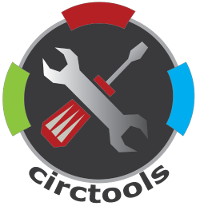circtools
a one-stop software solution for circular RNA research
Introduction
Circular RNAs (circRNAs) originate through back-splicing events from linear primary transcripts, are resistant to exonucleases, typically not polyadenylated, and have been shown to be highly specific for cell type and developmental stage. Although few circular RNA molecules have been shown to exhibit miRNA sponge function, for the vast majority of circRNAs however, their function is yet to be determined.
The prediction of circular RNAs is a multi-stage bioinformatics process starting with raw sequencing data and usually ending with a list of potential circRNA candidates which, depending on tissue and condition may contain hundreds to thousands of potential circRNAs. While there already exist a number of tools for the prediction process (e.g. DCC and CircTest), publicly available downstream analysis tools are rare.
We developed circtools, a modular, Python3-based framework for circRNA-related tools that unifies several functionalities in single command line driven software. The command line follows the circtools subcommand standard that is employed in samtools or bedtools. Currently, circtools includes modules for detecting and reconstructing circRNAs, a quick check of circRNA mapping results, RBP enrichment screenings, circRNA primer design, statistical testing, and an exon usage module.
Documentation
Click here to access the complete documentation on Read the Docs.
Installation
The circtools package is written in Python3 (>=3.4), two modules, namely detect and reconstruct also require a working Python 2 installation (>=2.7). It requires only a small number of external dependencies, namely standard bioinformatics tools:
- bedtools (>= 2.27.1) [RBP enrichment module, installed automatically]
- R (>= 3.3) [Data visualization and data processing]
Installation is managed through python3 setup.py install. No sudo
access is required if the installation is executed with --user which
will install the package in a user-writeable folder. The binaries should
be installed to /home/$user/.local/bin/ in case of Debian-based
systems.
circtools was developed and tested on Debian Jessie but should also
run with any distribution.
The installation requires running python on the command line:
git clone https://github.com/dieterich-lab/circtools.git cd circtools python3 setup.py install --verbose --user
The installation procedure will automatically install two dependencies: DCC and FUCHS. The primer-design module as well as the exon analysis and circRNA testing module require a working installation of R with BioConductor. All R packages required are automatically installed during the setup. Please see the "Installing circtools" chapter of the main circtools documentation for more detailed installation instructions.
Modules
Circtools currently offers seven modules:
detect (detailed documentation)
The detect command is an interface to
DCC, also developed at the
Dieterich Lab. The module allows to detect circRNAs from RNA sequencing
data. The module is the foundation of all other steps for the circtools
work flow. All parameters supplied to circtools will be directly passed
to DCC.
quickcheck (detailed documentation)
The quickcheck module of circtools is an easy way to check the results of a DCC run for problems and to quickly assess the number of circRNAs in a given experiment. The module needs the mapping log files produced by STAR as well as the directory with the DCC results. The module than generates a series of figures in PDF format to assess the results.
reconstruct (detailed documentation)
The reconstruct command is an interface to
FUCHS. FUCHS is employing
DCC-generated data to reconstruct circRNA structures. All parameters
supplied to circtools will be directly passed to FUCHS.
circtest (detailed documentation)
The circtest command is an interface to
CircTest. The module a a
very convenient way to employ statistical testing to circRNA candidates
generated with DCC without having to write an R script for each new
experiment. For detailed information on the implementation itself take a
look at the CircTest
documentation. In
essence, the module allows dynamic grouping of the columns (samples) in
the DCC data.
exon (detailed documentation)
The exon module of circtools employs the ballgown R
package
to combine data generated with DCC and circtest with ballgown-compatible
stringtie output or cufflinks output converted via
tablemaker in order get
deeper insights into differential exon usage within circRNA candidates.
enrich (detailed documentation)
The enrichment module may be used to identify circRNAs enriched for
specific RNA binding proteins (RBP) based on DCC-identified circRNAs and
processed
eCLIP
data. For K526 and HepG2 cell lines plenty of this data is available
through the
ENCODE
project.
primer (detailed documentation)
The primer command is used to design and visualize primers required
for follow up wet lab experiments to verify circRNA candidates.

